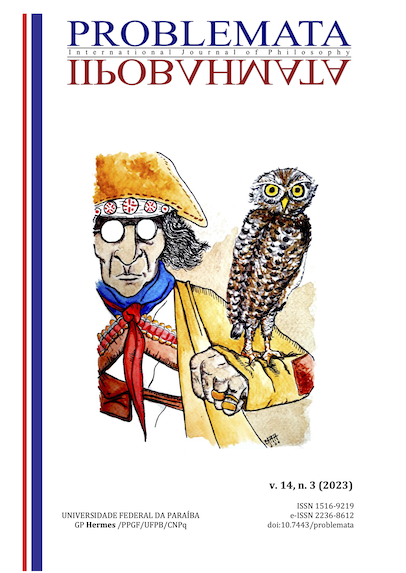CARTESIAN ASSUMPTIONS:
THE LIMITS OF SCIENTIFIC KNOWLEDGE AND THE ASSUMPTIONS USE
DOI:
https://doi.org/10.7443/problemata.v14i3.66680Keywords:
Epistemology Cartesian, infinite, intelligibility, freedom, magnetismusAbstract
This paper addresses to resume the discussion about Cartesian Science through problematization of the Cartesian rationalism limits. Descartes presents a very peculiar conception of scientific knowledge, in order to make wide use of hypotheses to explain natural phenomena and describing emergence of the world. This is one of the main points criticized by the followers of later experimental philosophy. However, it is possible to see that such a procedure is closely linked to the way Descartes understands the limits of human knowledge and its relationship with the guarantor of all truth: God. By carefully analyzing the epistemological assumptions of the Cartesian scientific proposal, it is possible to perceive “moral tension” in its construction that will be decisive for justifying the action of the spirit in search of answers: once defined the limit to human understanding, you can - and should - use all available resources to the spirit to the explanation of the world events. This issue will be discussed in Cartesian assembly work and the detailed examination of the case of magnetismus operated by Descartes in correspondence with Fr. Marin Mersenne.
Downloads
References
PRIMÁRIA
ADAM, C.; TANNERY, P. (éd.). Œuvres de Descartes. Revue et augmentée par B. Rochot et P. Costabel. Paris: Vrin, 1996. 11 v.
DESCARTES, René. Discurso do Método. São Paulo: Abril Cultural, 1973, p. 33-79 (Os Pensadores, v. 15).
DESCARTES, René. Meditações concernentes à primeira filosofia nas quais a existência de Deus e a distinção real entre a alma e o corpo do homem são demonstradas. São Paulo: Abril Cultural, 1973, p. 81-150 (Os Pensadores, v. 15).
DESCARTES, René. Meditações sobre Filosofia Primeira. Campinas: CEMODECON – IFCH/Unicamp, [199-]. Edição bilíngüe.
DESCARTES, René. Princípios da Filosofia. Lisboa: Edições 70, [199-].
DESCARTES, René. Regras para a Orientação do Espírito. São Paulo: Martins Fontes, 1999.
SECUNDÁRIA
ANDRADE, Érico. O Mecanicismo em questão: o magnetismo na filosofia natural cartesiana. Scientiæ Studia, São Paulo, v. 11, n. 4, p. 785-810, 2013.
BATTISTI, César Augusto. O Método de Análise em Descartes: da resolução de problemas à constituição do sistema do conhecimento. Cascavel: Edunioeste, 2002. (Estudos Filosóficos, 05).
DONATELLI, Marisa Carneiro de Oliveira Franco. A necessidade da certeza na explicação científica cartesiana e o recurso à experiência. Cadernos de História e Filosofia da Ciência. Campinas (CLE/Unicamp), série 3, v. 12, n. 1-2, p. 257-68, jan./dez. 2002.
GAUKROGER, Stephen. Descartes: uma biografia intelectual. Rio de Janeiro: Eduerj, 1999.
MOUY, Paul. Le développement de la physique cartésienne: 1646-1712. Paris: Vrin, 1934.
NEWTON, Isaac (1687). Princípios matemáticos de filosofia natural. 2. ed. São Paulo: Edusp, 2002.
PATY, Michel. Mathesis universalis e inteligibilidade em Descartes. Cadernos de História e Filosofia da Ciência. Campinas. Série 3, v. 8, n. 1, p. 9-57, jan.-jun., 1998.
TEIXEIRA, Lívio. Ensaio sobre a moral de Descartes. 2. ed. São Paulo: Brasiliense, 1990.
VOLTAIRE. Cartas Inglesas. São Paulo: Abril Cultural, 1973, p. 7-63 (Os Pensadores, v. 23).
WEBER, Jean-Paul. La constituition du texte des Regulae. Paris: Societé d’Édition d’Enseignement Supérieur, 1964.
Downloads
Published
Issue
Section
License
Copyright (c) 2023 Leandro de Araújo Sardeiro

This work is licensed under a Creative Commons Attribution 4.0 International License.
Authors who publish with this journal agree to the following terms:
- Authors retain copyright and grant the journal right of first publication with the work simultaneously licensed under a Creative Commons Attribution License that allows others to share the work with an acknowledgement of the work's authorship and initial publication in this journal.
- Authors are able to enter into separate, additional contractual arrangements for the non-exclusive distribution of the journal's published version of the work (e.g., post it to an institutional repository or publish it in a book), with an acknowledgement of its initial publication in this journal.
-
- Authors are permitted and encouraged to post their work online (e.g., in institutional repositories or on their website) prior to and during the submission process, as it can lead to productive exchanges, as well as earlier and greater citation of published work (See The Effect of Open Access).





